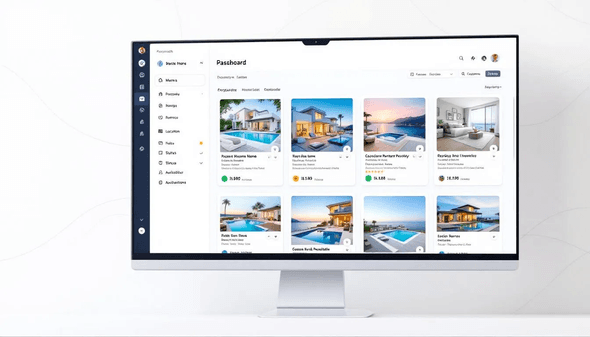What Software Assists with Scale Up for Growing Vacation Rental Businesses

Key Takeaways:
Scaling starts with systems, not more properties. The key to growth is automating before expanding, using the right software stack to handle bookings, guest messaging and pricing without adding more workload.
Property management software is your growth engine. A comprehensive PMS like Hostaway centralizes operations, connects booking channels, automates workflows and gives you the insights needed to manage 3 – 50+ properties efficiently.
Integrated tools drive scalability. Pairing your PMS with channel managers, dynamic pricing tools and automation platforms eliminates manual errors, boosts revenue and keeps your guest experience consistent.
Automation pays off fast. Data shows vacation rental businesses using full software integration cut operational time by up to 60% and raise per-property revenue by more than 20%.
Optimize first, then expand. Streamline workflows for your existing properties before scaling, this ensures smooth growth, prevents chaos and sets the stage for long-term profitability.
Scaling a vacation rental business takes more than adding new properties, it requires the right technology to grow without piling on extra work. Modern tools like property management systems, channel managers, dynamic pricing software and automation platforms allow hosts to expand from a couple of units to a full portfolio while keeping operations lean. By removing manual bottlenecks, these solutions make it possible to boost efficiency, maintain guest satisfaction and achieve sustainable growth.
This article covers the essential software categories that drive scalable growth, proven implementation strategies for short-term rental managers, cost-benefit analysis across different platforms and selection criteria for building your optimal tech stack. Whether you’re managing 3 properties or 25, you’ll discover how the right property management software transforms operational efficiency and business performance.
The key is to remember that successful property management business scaling requires automation before expansion, not after.
Understanding Scale-Up Software: Key Concepts and Definitions

Core definitions
Vacation rental software encompasses integrated platforms that automate core business processes including booking management, guest communications, pricing optimization and property coordination. Unlike basic listing tools, scale-up software creates operational systems that grow efficiently with your portfolio.
Property management systems (PMS) serve as the central platform connecting all business operations. These platforms manage bookings across multiple properties, automate guest messaging, coordinate cleaning schedules and provide data-driven insights for portfolio optimization.
Channel managers synchronize property listings, availability and pricing across major booking platforms like Airbnb, Vrbo, Booking.com and other online travel agencies. This technology prevents double bookings while maximizing exposure across multiple platforms simultaneously.
Automation tools handle repetitive tasks, including guest communication sequences, task assignment for cleaning teams, review requests and maintenance management workflows that traditionally consume significant manual effort.
Software category relationships
Modern short-term rental management operates through interconnected software systems where each component enhances the others:
Property management system → Channel manager → Multiple booking platforms → Revenue optimization
Guest communication platform → Task management → Service coordination → Improved guest satisfaction
Dynamic pricing tools → Market data analysis → Rate optimization → Increased revenue
Analytics dashboard → Performance tracking → Data-driven insights → Strategic growth decisions
This integration creates a unified ecosystem where booking data flows automatically between platforms, guest experiences remain consistent across properties and business performance metrics guide expansion decisions.
Why Scale-Up Software is Critical for Growing Vacation Rental Businesses

Property owners and managers using integrated vacation rental software can often handle 3 times more properties with the same team size compared to manual operations. Data shows that automation tools reduce operational time by 40-60%, allowing short-term rental managers to focus on strategic growth rather than daily task management.
“Hostaway is a robust system that does automation well. I’ve spent about 50% less time on guest communication and ‘stay management’ (e.g. creating an invoice or sending messages)” - Kilian Fenneberg, Founder & CEO, youpartments.
According to Hostaway users, short-term rental businesses implementing comprehensive software solutions experience:
22.3% average revenue increase per property through dynamic pricing and channel optimization
93% reduction in manual guest communications via automated messaging sequences
30-50% decrease in operational errors through systematic task automation
25% improvement in guest satisfaction scores due to consistent, timely communications
The financial impact becomes pronounced as portfolios grow. Managing 10+ properties manually requires exponentially more time per unit, while software-enabled operations maintain consistent per-property efficiency regardless of portfolio size. More experienced property managers report that proper vacation rental management software implementation enables sustainable growth beyond 50+ properties with lean operational teams.
Case Study: From Startup to International Scale — How The Flex Grew with Automation

When The Flex launched in London, the team managed just a few units aimed at corporate travelers. Fast forward a few years and they’re operating across four countries with launches planned in three more all while keeping their operational team lean and efficient.
By adopting Hostaway’s short-term rental management software early, The Flex laid the groundwork for sustainable, international growth. The platform enabled them to:
Automate guest messaging and task management
Sync listings across major booking channels
Manage 650+ tenants across 4 countries with 3 more launches underway
The results:
400% revenue growth YOY
£5M+ paid to property owners
A target of 1,000+ managed properties by 2027
“Hostaway isn’t just a tool, it’s part of our operating model. It’s what allows us to scale markets, grow partnerships and stay efficient.” - Michael Buggy, COO, The Flex
Essential Software Categories

Software category | Examples | Capacity | Key features |
Property management system | Hostaway | 2-1000+ properties | Booking management, guest messaging, task automation, reporting |
Channel manager | Hostaway | 2-1000+ properties | Multi-platform sync, avoid double bookings, pricing distribution |
Dynamic pricing tools | Hostaway Dynamic Pricing Tool, PriceLabs, Wheelhouse, Beyond Pricing | Unlimited properties | Market analysis, automated rate adjustments, revenue optimization |
Guest communication | Slack, WhatsApp, SMS via Hostaway | Unlimited messages | Automated sequences, unified inbox, review management |
Website builder | Hostaway, Wix, WordPress, Squarespace | Unlimited properties | Direct booking site, online payments, booking channel integration |
The most effective approach combines a comprehensive PMS as the foundation with specialized tools for pricing optimization and direct bookings. This tech stack provides complete operational coverage while maintaining cost efficiency for growing portfolios.
Step-by-Step Guide to Implementing Scale-Up Software
Scaling with software isn’t just about adding tools, it’s about building a foundation that supports growth without added complexity. The following steps walk you through how to do exactly that, starting with a look at your current operations.
Step 1: Assess current operations and identify bottlenecks
Before choosing any software, take stock of your current processes. The goal is to uncover which tasks slow you down the most as your portfolio grows. Focus your audit on three key areas:
Guest communication audit:
How much time does your team spend on back-and-forth messaging and how often does it lead to errors?
Time spent on booking confirmations, check-in instructions and guest inquiries
Frequency of communication errors or delays
Feedback or reviews mentioning communication quality
Property coordination checklist:
Look at how efficiently you manage onsite operations across your properties.
Cleaning schedules: how complex is the coordination?
Maintenance: how are issues reported and resolved?
Task tracking: how do you assign and confirm completion?
Revenue management analysis:
Assess whether your pricing strategy is dynamic or stuck on autopilot.
Pricing adjustment frequency and market responsiveness
Occupancy rate optimization across different seasons
Direct booking percentage versus booking fees paid to platforms
Once you’ve identified the most time-consuming and error-prone areas, you’ll know exactly where to start with your software stack. Your biggest bottlenecks become your top automation priorities.
Step 2: Select and implement core software stack
Choose your property management platform first: Your PMS is the operational hub for your entire business. It should centralize property data, streamline daily workflows and integrate seamlessly with tools for distribution, pricing, guest communication and reporting. Look for a platform that supports both your current size and your future scale, one that doesn’t require constant reconfiguration as your portfolio grows.
Add channel management for multi-platform distribution: Implement a vacation rental channel manager that connects with your PMS to synchronize listings across Airbnb, Vrbo, Booking.com and other platforms. This prevents double bookings while maximizing property exposure.
Integrate dynamic pricing tools: Connect automated pricing platforms to optimize rates based on demand, seasonality and local market conditions.
Step 3: Automate and optimize operations
Configure automated guest messaging sequences: Set up pre-arrival instructions, check-in details, local recommendations and checkout reminders that trigger automatically based on booking dates. Advanced systems like Hostaway handle routine guest communications without manual intervention.
Establish smart task management: Create automated cleaning schedules, maintenance request workflows and vendor coordination systems that assign tasks based on booking calendars and property requirements.
Track key performance indicators: Monitor occupancy rates, average daily rate improvements, guest satisfaction scores and operational efficiency metrics.
Common Software Implementation Mistakes to Avoid

1. Scaling before optimizing current systems and processes
Many short-term rental managers add more properties before establishing efficient operations for existing units. This creates compounding inefficiencies that software cannot resolve. Optimize workflows for 3-5 properties before expanding further.
2. Choosing software without proper integration capabilities
Selecting platforms that don’t connect with major booking channels or other essential tools creates data silos and manual workarounds. Prioritize software with robust API integrations and established marketplace partnerships.
3. Over-automating without maintaining personal guest touch
Complete automation can reduce the personalized guest experience that differentiates vacation rentals from hotels. Maintain strategic human touchpoints for special requests, local recommendations, and issue resolution.
Pro Tip: Start with core PMS functionality and gradually add specialized tools as your portfolio grows. This approach prevents overwhelming complexity while ensuring each software addition addresses specific operational needs.
Key Takeaways for Software-Enabled Scaling

Software-driven scaling transforms short-term rental management from labor-intensive coordination to strategic business growth. The four essential software categories, property management systems, channel managers, dynamic pricing tools and automation platforms, create operational foundations that scale efficiently with portfolio expansion.
Start with a comprehensive PMS like Hostaway that integrates seamlessly with booking channels and specialized tools rather than piecing together disconnected solutions. Integration capabilities determine long-term scalability and operational efficiency as your rental business grows.
Focus on automation before expansion. Establishing efficient systems for 3-5 properties creates the operational foundation needed to scale to 25+ units without proportional staff increases. The most successful vacation rental management businesses optimize first, then scale systematically.
Your next step, audit current manual processes to identify the biggest operational bottlenecks, then select a property management platform that addresses those specific challenges while providing integration pathways for future growth. Consider requesting free demos from leading platforms to evaluate which system best fits your portfolio’s unique requirements and expansion goals.
The vacation rental industry rewards systematic, technology-enabled growth over manual scaling attempts. With proper software implementation, managing properties becomes strategically manageable rather than operationally overwhelming.
FAQs about Vacation Rental Scale-Up Software
Q1: What’s the minimum portfolio size to justify short-term rental management software?
Most property managers benefit from basic PMS functionality starting at 2-3 properties, with advanced automation features becoming essential at 5+ properties. The time savings and error reduction typically justify costs immediately.
Q2: How much does vacation rental software typically cost?
Comprehensive software costs can range from $50-200 per property per month depending on feature set and integrations.
Q3: Can I integrate existing booking channels with new software?
Yes, modern property management platforms offer direct integrations with Airbnb, Vrbo, Booking.com and 20+ other major booking platforms. Channel managers synchronize availability and pricing automatically across all connected platforms.
Q4: What’s the ROI timeline for implementing scale-up software?
Most short-term rental managers see positive ROI within 3-6 months through increased operational efficiency, improved occupancy rates and dynamic pricing optimization. The payback accelerates significantly when expanding beyond 5+ properties.
Ready to find out how Hostaway can transform your business?
